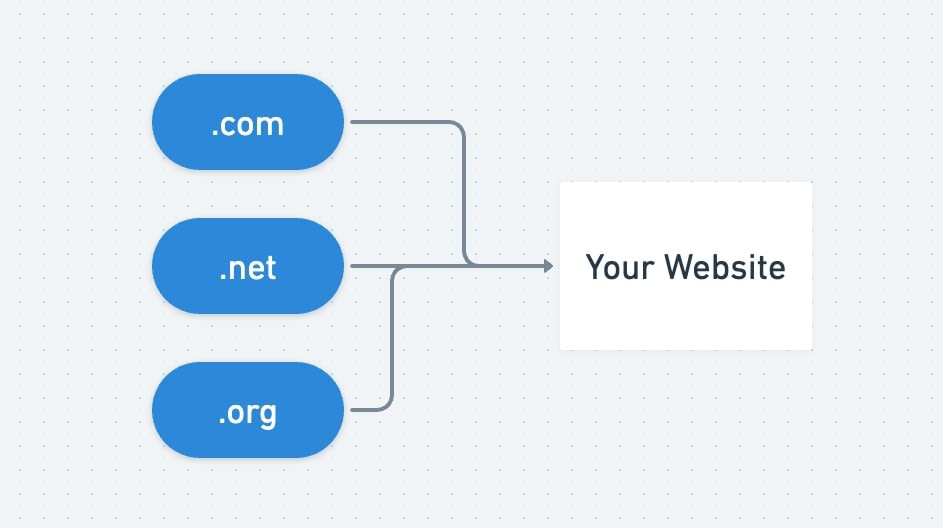So, you’ve just typed in your perfect domain name into a domain name registrar, only to find out that the .com extension is already taken. In that case, should you go with .org or .net?
In this post, we’ll discuss the differences between .org vs .net and give you advice on how to pick the one that suits your needs more. If you want to find out where you can register your .org and .net domains, read until the very end!
 Table of contents:
Table of contents:
What are domain extensions?
Domain extensions, also known as top-level domains or TLDs, are the suffix that follows the name of your web address.
For example, in a web address like mydomain.com, the domain extension of the web address is .com.
While the three most popular domain extensions available are .com, .net, and .org, all domain extensions are generally classified into three categories:
Generic domain extensions
These are the most popular type of domain extensions, as they’re well-suited to fit the purposes of commercial and online businesses.
Though generic domain extensions started with .com, .org, .net, the lineup has been enriched with new top-level domains in recent years. That’s why you can often come across such domains as .design, .beer, .blog, and many – many(!) – more.
When it all started with just the big three, the intended purposes of the extensions were:
- .com for “commercial” websites and businesses;
- .net for “networking” companies and Internet Service Providers (ISP);
- .org for non-profit “organizations” and charities.
Nowadays, however, you don’t have to worry that much about registering a .net, even though you might have nothing to do with networking. There’s no one overseeing the nature of each registered domain or website. Therefore, the original purposes of these domain extensions aren’t something to worry about in 2022.
Restricted domain extensions
This type of domain extension is strictly restricted to certain organizations and institutions. In most cases, you won’t have the ability to register a new domain name under any of them.
The most common ones are:
- .edu – reserved for “educational” institutions and universities;
- .gov – reserved for the US “governmental” agencies;
- .mil – reserved for the US “military” use.
Country code domain extensions
Almost all countries have a domain extension that’s peculiar to them. For example:
- .us for the United States;
- .co.uk for the United Kingdom;
- .it for Italy;
- .ru for Russia;
- .de for Germany.
There are literally hundreds of other country code domain extensions out there.
Why not just go for a .com?
When most people think of registering a domain name for their new website project, the domain extension they usually start with is the .com.
This is perfectly natural since .com is by far the most popular and trusted domain extension of them all.
Internet users perceive .com domains as wielding more authority in a specific niche. Hence, there’s a crazy rush for them.
As a matter of fact, over 50% of top-level domains are a .com [1].
It’s for this reason that many of your future customers will be naturally inclined to expect that your website address ends with a .com, even if it doesn’t.
If your brand name is PizzasGalore, for example, most people are going to expect to find it under PizzasGalore.com, even though you might have registered it as PizzasGalore.net.
They’ll either land on a blank page or find themselves on a competitor’s website.
This is in short why you should try registering your web address as a .com first.
If it’s not available, then you can settle for a .net or .org domain extension. However, you still need to be careful when doing so.
Basically, you shouldn’t get the same branded .net or .org domain names that someone else has the .com for. So for instance, if someone has UniqueBusinessName.com, then you don’t actually want to get UniqueBusinessName.org or .net. Why? Because (1) you’re likely infringing on a trademark that the owner of the .com domain has established, and (2) you’re only making it confusing for your visitors – i.e., they will never memorize whether your site is the one with a .com or a .net.
One workaround – if the .com you want is taken – is to tweak the phrase you want to register a bit and go for a slight variation of it. Try spelling your domain name unconventionally, or adding a prefix or suffix to the name.
“Hold on, hold on!” – says you – “Why are you telling me how to register a .com? What I wanted was a .net or .org!”
Here’s the kicker. We don’t believe you should register a .net or .org domain on its own. Do it only once you already have a corresponding .com.
This goes back to the two issues I mentioned a couple of paragraphs above. Basically, you want your site visitors to find your website no matter if they use a .com or a .net/.org. In other words, this is what you want:


How to decide between .org and .net
As we said earlier, the .org and .net domain extensions were originally created for different categories of websites.
However, as the internet has evolved with the rising unavailability of short .com domains, those dividing lines have been blurred as webmasters now use the .org and .net extensions as alternatives without considering the site’s primary purpose.
That being said, you should still consider a couple of factors when deciding between .net and .org.
When to choose .org
Coming in as the runner-up alternative for .com extensions, .org was originally intended for non-profit organizations, charities, religious websites, and open-source tools/resources.
With the over-saturation of the .com extension, though, at 161.1 million domain registrations, it’s just far easier to get a .org as only 10.3 million .org domains have been registered so far (2022 data) [2][3].
Therefore, as a top-level domain with a good overall reputation, .org can be a great choice if you’re building a website to offer free resources or education, be the hub for a charity, or offer scientific info in a non-profit framework for the public.
On the other hand, if you’re using the .org extension as a replacement for a .com, and you intend on running an ecommerce store, for instance, then you might want to look for other options for additional TLDs.
When to choose .net
The .net domain is the most recommended alternative to the .com extension. Unlike .org, no one will judge you for having a 100% commercial website with a .net web address.
Domains ending with .net were intended to be used by networking companies, tech startups, forums, or any website involving a group of people meeting together online. Thus, online collaboration, any sort of remote tool, project management software, and so on, are ideal for a .net domain extension.
Where to get .org vs .net domains
The .org and .net domains are two of the easiest domains to purchase, and we’ll show you two credible registrars that offer them:
1. Namecheap
Namecheap is one of the most reliable and cheapest places to buy any domain name, not just .org or .net.
Apart from the registration itself, Namecheap also provides security and privacy features, standard web hosting, and even more advanced forms of web hosting, such as managed WordPress hosting.
Most importantly, you don’t have to break the bank when purchasing your .org or .net extensions from Namecheap.
All you have to do is head over to Namecheap.com and search for your domain availability using the main search box on the homepage:


You’ll be alerted if the domain name is already in use or if it’s available.
To purchase the domain name, you just have to provide some basic personal details and choose a form of payment.
Here are the prices of .org vs .net at Namecheap:
- .org – starting at $11.98 for the first year;
- .net – starting at $11.98 for the first year;
- .com – starting at $8.88 for the first year.
2. Domain.com
Domain.com is an all-in-one domain service provider that helps you register domains with any extension of your choice and also offers web hosting, email marketing services, and even a website builder.
You can register other top-level domains with Domain.com as well – and not only the classic .com but also more original domains, such as .store, .blog, and more.
To get started, go to Domain.com and type in your desired domain, then click on Search:


If your domain is available, you will have the opportunity to purchase it after providing some basic personal info and deciding on the payment form.
Here are the prices of .org vs .net at Domain.com:
- .org – starting at $14.99 for the first year;
- .net – starting at $12.99 for the first year;
- .com – starting at $9.99 for the first year.
Final thoughts on .org vs .net domains
In this .org vs .net comparison, you have learned about what domain extensions are overall, the importance of owning a .com domain, and also how to decide between .org vs .net for your alternative domain extension. Lastly, we also showed you where to head to get your desired domain name.
 If you’re still not quite sure what to do, consider this short summary:
If you’re still not quite sure what to do, consider this short summary:
- Always get a .com as your primary choice.
- Get a .net or .org as your secondary/additional domain name if those extensions make sense for the type of your organization/business/website.
- Register your domain name with either Namecheap or Domain.com – they offer the cheapest prices and a nice set of extra services should you need them.
Let us know if you have any questions on how to decide between .org vs .net or how to register your ideal domain name.
The post .ORG vs .NET: How They Differ and Which One to Choose appeared first on Revive Social.
Revive Social

